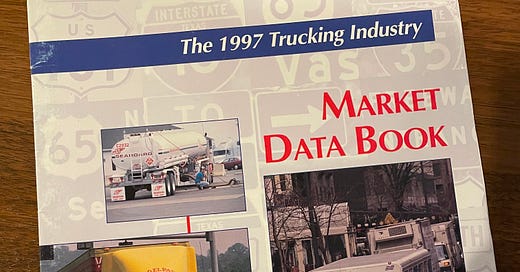I spent an entire college summer writing this 19-page booklet for the publishing arm of the American Trucking Associations. I was given a desk, and a computer, but it wasn’t connected to the internet. I had to wear a tie, except on Fridays. One afternoon I got so bored I took a novel into the bathroom, where I stayed long enough for the motion-activated lights to switch off. I had to open the stall door and wave my arms around to prove I was alive.
What I’d really wanted was to spend the summer in my little college town, waiting tables at Chili’s or Texas Roadhouse, or working at the coffee shop that hosted open-mic poetry nights during the semester. But those jobs were hard to come by, especially if you didn’t have service-industry experience. What I did have were writing clips, from the previous summer’s internship, for a trade publication about alternative-fuel vehicles. I hadn’t particularly wanted that job, either.
Maybe it sounds strange, a college kid who’d rather wait tables or make lattes than take a paid, potentially career-building internship. But this was the mid-90s. I was 19. I still thought Ethan Hawke’s character in Reality Bites was aspirational, rather than insufferable.
I probably could have written the Market Data Book in a month, if I’d put my nose to the grindstone. But the ATA was paying me for three, so I had to string it out. Sometimes I’d ask my boss if there were other projects I could take on, even minor ones, but he’d make a serious face and say, “Let’s just concentrate on the book. Let’s make sure we get that book together.”
Later, I’d learn that the previous summer’s intern had failed to turn in more than a couple sloppy pages. Which explained why the stack of research materials my boss had left for me, at the beginning of the summer, included the 1995 Market Data Book, but not the 1996 version. Though when I asked him about it, he only said something vague about “production trouble.” I had to get the real scoop from the woman who sat catty-cornered from me, and who spent most of her days on the phone, as a one-woman accounts-receivables department. “I don’t know what that boy did all summer,” she said. “He sure looked busy.”
Looking busy, I’d come to understand, was a key survival skill in an office job. In later years, I’d at least have the benefit of websites like Gawker, The Morning News, The Black Table, ESPN’s Page 2. I’d develop a quick trigger finger with a mouse, an ability to click away to another tab at the faintest sound of a boss’s approaching footsteps. But in the summer of 1996, I had to get creative. After the bathroom incident, I started photocopying pages of novels and magazines, which I could then read at my desk, while appearing to be engaged in “research.” I also wrote about a hundred pages of a poorly-conceived novel, the plot of which involved a government conspiracy in which the president was actually dead, Weekend at Bernie’s-style, but his aides and a few key Congressmen managed to trot him out to enough photo ops that no one noticed. I’d been reading a lot of Tom Robbins, and was aiming for something like his zany, countercultural vibe, but in my 19-year-old hands I’m pretty sure the whole thing came off as smug and didactic.
I never gave much thought to the politics of the organization I was working for. At least not until I attended a late-summer luncheon with the other interns, who all worked at the ATA’s M Street lobbying offices (the publishing people worked across the river in Virginia). They were wearing repp ties and navy blue blazers, and had that uncanny Young Republican ability to look simultaneously like children and middle-aged men. Like David Spade’s character in P.C.U., a movie my college roommate and I loved to watch when we got stoned. After lunch, some ATA official gave a speech about how it was a great time to get involved in government affairs, now that Newt Gingrich was bringing back “common sense” to Washington.
I shouldn’t have been surprised, really, given what I was writing for the Market Data Book, which includes lines like this one: “While program cuts under the 104th Congress have caused concern for many, the trucking industry has benefited by increased freedoms from arbitrary and costly regulation.” Or this, a few pages later: “Fueled by the misconception that large trucks are unsafe, and by the often negative public attitudes toward them, safety requirements are on the rise.”
Putting aside the questionable truth-value of those sentences, I have to say: at 19, I was pretty good at writing sentences! At least if we define “sentence-writing” in a particularly narrow way, in which I, the writer, have no responsibility for the underlying ideas, but am charged only with building for them an elegant delivery system.
That kind of sentence-writing, I know now, can be pretty lucrative. Lots of people, especially in the worlds of politics and public relations, will pay good money for someone to build elegant delivery systems for their bad, possibly even nefarious, ideas. Maybe in some parallel universe there’s a version of me who traded his sentence-writing talents for increasingly large sums of money, then had the kind of mid-career crisis of faith that causes people to write hand-wringing New York Times op-eds—guest columns that are one part mea culpa, one part brand-building for your new nonprofit/think tank/political consultancy/whatever.
I’d like to say I was too idealistic for that, and maybe I was. But also, I was kind of a slacker. I didn’t like being told what to do. I was easily bored. I didn’t like wearing a tie, or spending an entire morning looking forward to lunch.
I remember a conversation that summer with this late-20s guy who worked in marketing, and who told me how much he preferred working in an office to college. In college, he said, there was always more reading to do, more studying, but now, at the end of the day, he could go home and turn his brain off until morning. “Do you know how excited I was,” he said, “when I realized I’d never have to read another book in my life?”
For the rest of the summer I carved a wide arc around that guy, in case whatever malady had got hold of him was contagious. Personally, I loved college, and I was counting the days until I could return. After work I’d go to the gym, then back to my parents’ Alexandria townhouse, where I’d have dinner with them before retiring to the basement to read, or watch whatever movie I’d brought home from Blockbuster. My favorites, at the time, were in a genre I thought of as “talkies,” because their plots centered mostly on youngish people talking: at bars, at parties, in coffee shops, in the parking lots of convenience stores. There were a lot of these movies in the mid-90s.
It’s possible that my decision, the next fall, to declare a philosophy minor was inspired by the characters in those movies. They were smart, and well-read, but their intelligence and education, the movies seemed to suggest, didn’t have to be skills in service of jobs or money, but could instead be ends in themselves. If you read enough books, you could have interesting conversations with people at parties. Occasionally, women might find you charming. If you were really lucky, a smart, interesting woman—a Parker Posey type, let’s say—might fall in love with you, and then you could spend the rest of your lives being smart and interesting together.
Eventually I did get to spend a summer in my college town. I found a landscaping job, which on the best of days allowed me to pilot a riding lawn mower back and forth across the seemingly endless fields of rural Virginia, alone with my thoughts. On the worst days it involved too much direct sun, and a lot of mulch. Truthfully there were more of the latter than the former, but our crew got to knock off each day in mid-afternoon, after which I could lounge with a book at the coffee shop that probably still had a copy of my resume buried in a folder somewhere. I could meet other friends who’d lingered in town at one of the local bars that, during the semester, was too packed and noisy for real conversation.








Just related to this writing on a lot of levels, Mike. I loved those 90s "talkies" movies, too! I wanted to be that Parker Posey type, and I kept running into the "not have to read another book ever" dudes. Sometime I'll compare notes about the law firm I worked at the convinced me I did not want to go to law school. Thanks, as ever, for a great essay.